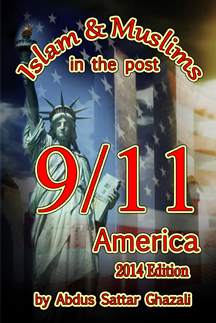Book Review (Continued) :
Islam & Muslims in the 21st Century by Abdus Sattar Ghazali (2017)
As we have repeatedly seen in matters relating to Kashmir, Palestine, East Turkestan and Chechnya – just to name a few – when it comes to saving Muslim lives in harm’s way, the United Nations has failed them miserably. One can only wonder what stops the UNSC to take punitive actions against the savages inside Suu Kyi’s government and security forces for their crimes against humanity! Don’t the Rohingyas qualify for the R2P (Responsibility to Protect) that was unanimously adopted by all members of the United Nations General Assembly at the 2005 World Summit?
Do they have to be children of a ‘higher’ God to qualify for such protection?
What future awaits humanity, including the Muslims, in this age of social media and information superhighway?
Knowing the value of controlling the mind, as Ghazali duly notes, the return of orientalism is currently taking place more in popular literature than in academic works in the US and western Europe. The shock and impact of 9/11 has created a fertile ground for the proliferation of what can be called an alarmist literature that are filled with shabby screeds bearing screaming headlines and titles about Islam and terror. (p. 115) There is such a mushrooming of pseudo-experts, polemicists and pundits on Islam who cares to learn the truth about Islam and Muslims from its original sources and writings of Islamic savants – like Rumi, Ghazali or Sa’di – and genuine experts or witnessing the lives of the pious believers!
While covering Islam and Muslims, the western media continue to apply negative images and characterization for Muslims.
Islamophobia is sold as an elixir these days by those who want to expedite the Armageddon. President Eisenhower’s fear of ‘industrial military complex’ is no longer a myth but has become a reality. Regional unrest is not only tolerated but it is encouraged to solidify the control of all those involved with the war industry.
Ghazali quotes a Rand study (December 2004) that suggested that Sunni, Shiite and Arab, non-Arab divides should be exploited to promote the US policy objectives in the Muslim world.
According to Ghazali, “Islamophobia is systematically promoted and financially supported in the United States in the form of books, reports, websites, blogs, and carefully crafted talking points that are well funded by hate groups. The project of Islamophobia which has cost more than $40 million over the past ten years has been funded by seven foundations in the United States: 1. Richard Mellon Scaife Foundation; 2. Lynde and Harry Bradley Foundation; 3. Newton and Rochelle Becker; 4. Foundation and Newton and Rochelle Becker Charitable Trust; 5. Russell Berrie Foundation, Anchorage Charitable Fund and William Rosenwald; 6. Family Fund; 7. Fairbrook Foundation.”
Islamophobia has essentially become the neo-orientalism of the 21st century. Not surprisingly, the self-proclaimed Islamic expert Steven Emerson collected $3.39 million for his for-profit company in 2008 for researching alleged ties between American Muslims and overseas terrorism. (p. 126)
Ghazali writes, “In late March 2015, Senator Ted Cruze appeared at the New England Freedom Conference with anti-Muslim hate group leader, Robert Spencer, a blogger whose work was cited approvingly by the Norway terrorist Anders Breivik. Spencer’s organization, the American Freedom Defense Initiative (AFDI), is the group behind controversial and provocative anti-Islam metro and bus ads.” (p. 145)
Ghazali shows that 39 years after the publication Professor Said’s book - Orientalism – modern imperialism never ended. While its goal to maximize benefits remains the same, its method to achieve that goal, however, has changed. It wants division along the fault lines - territorial, tribal, ethnic or whatever – so that the Muslim world remain ever weak and goes back to the days of the pre-Islamic Jahiliya with never-ending wars, buying weapons to fight each other. As events have proven, the scheme of the neo-imperial masters and planners is working.
To schmooze, the Arabs and Muslims have been told that victimology and dwelling on the depredations of empire is only a way of evading responsibility in the present. “You have failed, you have gone wrong, says the modern Orientalist.” But such a narrative would exhibit only a serious amnesia about the reality of imperial intrusion that continues to work its way in the lives of Muslims who comprise roughly 23% of world population.
Samuel Huntington's entire argument about Islam and civilizations is full of contradictions and superficialities; it is also 'culturally racist'. For Huntington, Islam is ideologically hostile and anti-Western; it is also a military threat in itself due to Chinese (Confucian) arms supplies; Islam is bloody, with a long warring tradition against the West (the fact that Muslims have often been the victims rather than the perpetrators of violence from Bosnia to India hardly troubles him). As such, Huntington justifies military solutions to bring about the ‘desired’ result.
Paul Wolfowitz, the former US Deputy Defense Secretary, a leading neocon, confided on the eve of the U.S. invasion of Iraq in March 2003: "We need an Islamic reformation and I think there is real hope for one." Iraq became the first casualty of that experiment. But the conspiracy lingers!
The Rand Study, released on March 18, 2004, apparently unveils the neocons’ plan for global ‘revamping’ of Islam.
As a result of the meticulously planned and organized onslaught against Islam, Professor Sa’id observed that the Muslim world has slipped into an “easy anti-Americanism that shows little understanding of what the US is really like as a society… The world-wide protests before the war began in Iraq would not have been possible were it not for the existence of alternative communities all across the world, informed by alternative information, and keenly aware of the environmental, human rights and libertarian impulses that bind us together in this tiny planet.”
Is there then a hope to defeat the merchants and profiteers of war through alternative media? One must, however, be reminded here that massive protest marches of millions of conscientious global citizens did not sway a bit the Bush Jr. administration from manufacturing lies and carrying out its planned war that killed nearly a million innocent Iraqis. The UN failed to slow down Bush Jr.
In spite of the evil plan of its enemies to turn our world into war zones and killing fields, the Muslim world needs serious introspection by its genuine enlightened intellectuals that can diagnose its plethora of illnesses that had transformed it into a world of zeros in the global arena. Ghazali reminds us that the peculiar way the political development has taken place in the Muslim countries have created elite groups that care about only themselves in which there is no share for the ordinary masses. They are for self-aggrandizement and don’t mind selling the interest of the people to the highest foreign bidder. No wonder the Muslim world has so many of these self-serving puppets, despots and autocrats ruling its people who has no fear of accountability either to God or His creation.
Will that scenario change any time soon?
Ghazail’s book is a treasure trove that delves into the problems and challenges faced by the Muslims of the 21st century by filling in the void left open after Professor Said’s death. I strongly recommend it.
Dr. Habib Siddiqui has authored 11 books, five of which are now available through Amazon.com. His latest book - Devotional Stories is published by A.S. Noordeen, Malaysia. Dr. Siddiqui is an alumnus of the prestigious University of Southern California, Los Angeles, where he earned his Ph.D.
This review was also published by Asian Tribune, Media Monitor Network and UNDPI.Org
Click here to buy the book: Islam & Muslims in the 21st Century

The Journal of America Team:
Editor in chief:
Abdus Sattar Ghazali
Senior Editor:
Prof. Arthur Scott
Disclaimer and Fair Use Notice: Many articles on this web site are written by independent individuals or organizations. Their opinions do not necessarily reflect those of the Journal of America and its affiliates. They are put here for interest and reference only. More details
Your donation
is tax deductable.
Article by
Journal Writes


